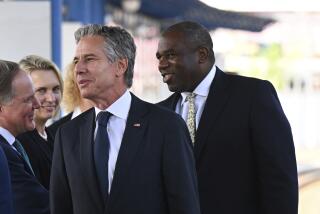Clinton Aides Rush to Shore Up Russia : Policy: President orders crash program on new aid in a bid to strengthen Boris Yeltsinâs hand.
WASHINGTON â President Clinton has directed aides to work on a crash program of new proposals for aid to Russia with the aim of strengthening Boris N. Yeltsin in his power struggle with the Russian Parliament, Administration officials said Friday.
âThere is a great deal of pressure coming from the White House to think of something that will help Yeltsin,â a senior official said.
âBut itâs hard to come up with much that will have an effect in the short run,â he added. âRussia is a grown-up country. It is hard to manipulate events there from the outside.â
Officials at the Treasury and State departments have been discussing proposals for new Western aid to Russia that could divide the opposition to Yeltsin by appealing to a powerful bloc of Russian industrialists that now supports the opposition, he said.
But there is no certainty that such a plan would succeed, he said.
Moreover, even if the Russian president succeeds in his plan to call a referendum on presidential rule in Russia, âthere is not much confidence here that he would prevail,â the official said.
Clinton had already directed officials to prepare new aid proposals in advance of his planned summit meeting with Yeltsin in Vancouver, Canada, on April 3 and 4, which senior Administration officials say they assume is still on.
But the political crisis in Moscow gave new impetus to the effort, officials said.
Clintonâs drive for increased aid picked up some unexpected support from the Senate Republican leader, Sen. Bob Dole (R-Kan.), who said that the United States should rally major Western European nations and Japan to help Yeltsin.
âWe may have to spend some money to do it,â Dole told the National Conference of State Legislatures. He noted that foreign aid is not popular but argued that it is better to spend money on aid than to prepare for another arms race âif Yeltsin goes down the drain.â
âIâd rather feed them than fight them at some future date,â said Dole, who represents a major wheat-growing state.
The U.S. Agriculture Department announced Friday that the United States will donate $102 million worth of wheat and rice to the Russian Federation. The gift âreaffirms the United Statesâ support for the democratic reforms that are taking place in Russia today,â the Associated Press quoted Agriculture Secretary Mike Espy as saying. âIt also illustrates our intent to maintain a presence for U.S. agriculture in this important market.â
Part of the U.S. strategy, embodied in repeated public statements this week by Clinton, Secretary of State Warren Christopher and others, is a hope that assurances of Western support for Yeltsin--and implicit promises of increased economic aid if he remains in power--might help tip the balance in Moscow.
But it is unclear whether such assurances have much real effect on Russian politics. Former President George Bush and other Western leaders promised Russia $24 billion in aid last year but failed to deliver most of the funds, leading to complaints from opposition politicians in Moscow that Western promises were empty.
Clinton renewed his support for Yeltsin again Friday, saying: âI support democracy in Russia and the movement to a market economy, and Boris Yeltsin is the elected president of Russia. He represents that reform.â
Clinton said he hopes Russiaâs political crisis can be solved within its current constitution. âThey are having a parliamentary dispute over there, which, as far as I can see, is within the bounds of legal authority,â he said. âI hope whatever is done in Russia is consistent with that.â
Russiaâs Congress of Peopleâs Deputies has been stripping Yeltsin of much of his power, and Yeltsin has responded by demanding a referendum and hinting that he may dissolve the Congress if he is thwarted.
Yeltsinâs foreign minister, Andrei V. Kozyrev, telephoned Christopher on Friday morning to assure the Clinton Administration that Yeltsin is committed to democracy and hopes to resolve the crisis âthrough the ballot box.â
State Department spokesman Richard A. Boucher quoted Kozyrev as saying, âPresident Yeltsin remains committed to democracy, human rights and the maintenance of civic order.â
Boucher said Kozyrev did not indicate whether Yeltsin has decided to dissolve the Parliament and rule by decree, and Christopher apparently did not offer any U.S. view on that option.
One U.S. official said the Administration would be âvery understandingâ if Yeltsin dissolved the Parliament, which he noted was elected under old-style Soviet rules without fully open competition.
âSome people (in the Administration) have suggested that it might even be a good thing,â he said, although the Administrationâs official policy is that it would prefer a less drastic outcome.
Referring to Clintonâs scheduled meeting with Yeltsin early in April, Dole said: âThatâs going to help Yeltsin and the reformers in the former Soviet Union.â
Times staff writer William J. Eaton contributed to this report.
More to Read
Sign up for Essential California
The most important California stories and recommendations in your inbox every morning.
You may occasionally receive promotional content from the Los Angeles Times.











